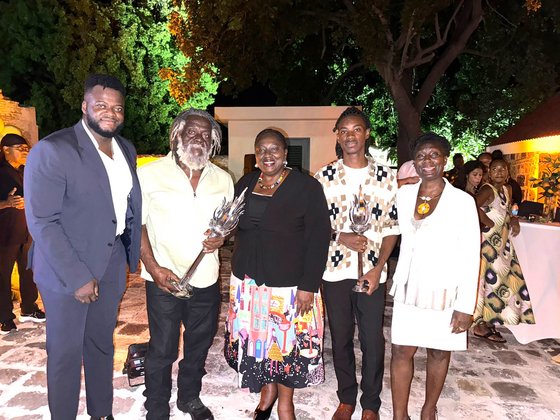During the ceremony, speeches were delivered by Committee Chair Astrid Elburg, Commissioner for Culture Rechelline Leerdam, Head of the Statia office Raimie Richardson, and Lucia Beck, Director of the Slavery Memorial Committee in the Caribbean region.
Astrid Elburg opened with a powerful message: ‘We open the doors of our new office here on Statia. But symbolically, we are opening something far more important: a door to belonging, to unapologetically being. A door to a future in which the full truth of our history is honoured.’
Commissioner Leerdam expressed the following: ‘May this office stand as a testament to our past, a forum for dialogue in our present, and a beacon of hope for our future – a future where we continue to transform from victim to victor, standing tall in the strength of our shared heritage and the resilience of our community.’
Raimie Richardson emphasised the inner strength of emancipation: ‘Emancipation is not borrowed or given; it has been there from the very beginning – woven into the fabric of who we are since the dawn of time. It is something that resides within us, something we claim and nurture through understanding, pride, and resilience.’
He concluded his speech with a call for unity: ‘Let this memorial be a beacon, not only of remembrance, but also of strength. Let it remind us that our past is not a chain, but a stepping stone. And as we look ahead, let us walk forward with pride, purpose, and unity.’
Lucia Beck closed the speeches with words about the future and coming generations: ‘Today marks a new beginning. Together, we are stepping into a new chapter – one filled with truth, healing, and transformation. We are going to achieve great things – not for ourselves, but for the generations yet to come. For those who will one day walk these streets, hear these names, and know they belong to something greater.’
Passing of the Torch of Emancipation
After the speeches, a special ceremonial moment took place in the courtyard: the presentation of the Torch of Emancipation to Joshua Spanner and Ishn Courtar, who also served as master of ceremonies for the evening. This symbolic torch lights the way for the transfer of knowledge between the older and younger generations.
For many years, Joshua Spanner has been a driving force behind the commemoration of the abolition of slavery on Statia. Long before the Netherlands issued its apology, he tirelessly fought for recognition. His efforts have included school visits and numerous programmes on African heritage and the memory of the enslaved ancestors of the island. Upon receiving the torch, he remarked: ‘It was never about a torch. It was always our ancestors walking.’
Ishn Courtar is a young Statian who is deeply committed to preserving and promoting the island’s cultural heritage and supporting its youth. He is a strong advocate for Statian culture and history, actively contributing to the strengthening of cultural identity among young people.
Exhibition ‘US: Where Past and Present Meet’
Later in the evening, the exhibition US: Where Past and Present Meet was presented. The exhibition, featuring AI-generated videos, tells the story of the time before slavery in Africa, the transatlantic slave trade, the heroes in the Caribbean part of the Kingdom and Suriname, the emancipation, and the Netherlands’ apology for its role in the history of slavery.
With the opening of the office and the exhibition, the Slavery Memorial Committee aims to contribute to ongoing dialogue, education, and awareness – both on Statia and throughout the wider region.
The Statia office is the Committee’s second in the Caribbean part of the Kingdom. On Sunday 25 May, the office in Curaçao opened its doors. In the Netherlands, an office has been active in The Hague since April. Together, these three locations serve the entire Kingdom. Curaçao and Statia were chosen specifically because of the prominent role both islands played in the history of slavery.
